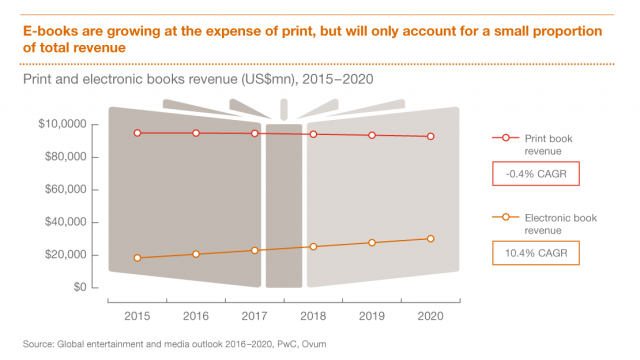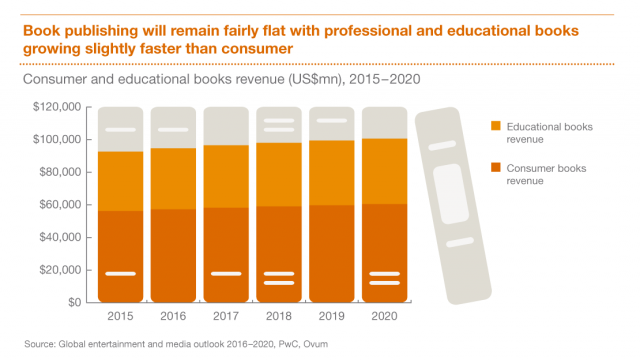In North America, where Amazon kicked off the modern ebook business in 2007, some book industry experts today are lamenting the recent decline of ebook revenues. Ebook markets outside the US, however, have a different situation and possibly also outlook for the future. PWC, a consultancy, forecasts that globally ebook sales continue to grow steadily, whereas print book revenues continue their gradual fall. PWC’s forecast is projected until 2020.
 Annual growth rate for ebooks 10.4% and for print books -0.4% until 2020 according to PWC.
Annual growth rate for ebooks 10.4% and for print books -0.4% until 2020 according to PWC.
In regions like Europe, Asia and the Pacific, the adoption of ebooks have been a lot slower than in the US. For instance, in many European countries the market share of ebooks from the total book market is at 1 – 5% level. There is room for growth. Plenty of it. Sales channels are still being established (for instance, grocery store Aldi in Germany and subscription service Storytel in Scandinavia), tax laws are being amended (in order to treat ebooks equally with print books), self-publishing services are being set up, and people are realizing that large screen smartphones are reading devices.
Do you remember when the Internet bubble burst in 2001? It had been a wild run since the IPO of Netscape in 1995. For some pundits, 2001 was the end of the Internet business and tech business. Well, what happened? Today, they are shaping our world in all fields of life: transportation, entertainment, shopping, working, relationships, you name it.
The fact is that the world is taking its first baby steps in the new era of digital media that today also features electronic books. Today’s ebooks are more or less direct conversions of print books into electronic format – sometimes not even conversions if an ebook is delivered as an PDF file. Multimedia and augmented reality are some of the technologies that may get smartphone-generations to read commercial ebooks just like they read fan fiction, messages or watch online videos. Books will develop with technology, but the concept of book is so strong that it will remain.
So, yes, PWC’s cautious forecast for global annual ebook revenue growth of 10.4% is way more likely to happen than the decline of revenues in the US would turn into a long term trend.

